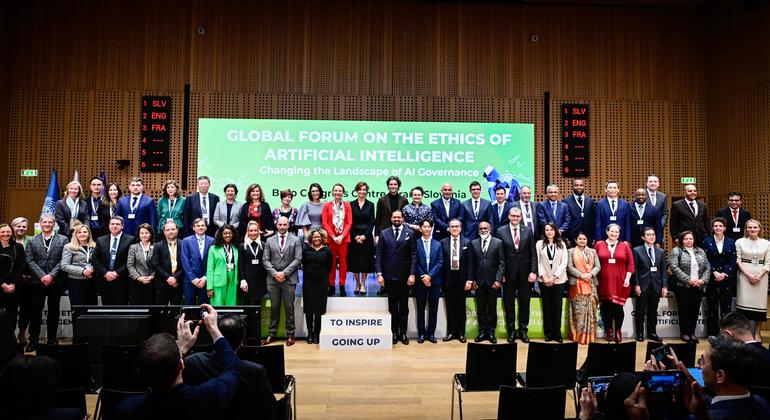Lenovo Group, LG AI Research, Mastercard, Microsoft, Salesforce, Telefonica, GSMA network of mobile phone operators, and INNIT have committed to integrating the values and principles outlined in UNESCO’s Recommendation on the Ethics of AI into their AI system design and deployment processes.
The pledge was announced during the UN Global Forum on AI held in Slovenia on Monday and Tuesday, where UNESCO facilitated a consensus among its member States in November 2021 to adopt the first global ethical framework for AI usage.
UNESCO’s Director-General, Audrey Azoulay, emphasized the significance of this commitment, urging other tech stakeholders to emulate these pioneering companies. The collaboration between the public and private sectors is deemed crucial for developing AI technologies that serve the common good.
This groundbreaking agreement mandates companies to uphold human rights throughout the entire AI lifecycle, encompassing design, development, procurement, sales, and usage. It underscores the importance of conducting due diligence to ensure compliance with safety standards, identifying potential negative impacts of AI, and implementing timely measures to prevent, mitigate, or address them in accordance with domestic laws.
Moreover, the agreement highlights the necessity of pre-market testing for new AI systems and recommends the establishment of post-deployment risk assessments and mitigation strategies to adapt to the rapidly evolving AI landscape.
In a related development underscoring the need for robust AI oversight, a prominent UN-appointed human rights expert raised concerns about the surge in reported cases of child sexual abuse material online, attributing the escalation to advancements in generative AI and eXtended Reality technologies. The expert warned of the proliferation of computer-generated illicit content distributed through encrypted channels, posing significant challenges in combating child exploitation online.
The expert also criticized the private sector and major tech companies for their perceived unreliability in addressing issues such as biases, programming flaws, and surveillance software inadequacies related to detecting child abuse. The call for enhanced collaboration between governments, companies, and victims to develop ethical digital solutions for a safer online environment was emphasized.
Additionally, the UN migration agency and human rights experts shed light on the deepening humanitarian crisis in Sudan, where 25 million people, including 14 million children, require urgent humanitarian aid. The ongoing conflict in Sudan has displaced over 1.7 million individuals, with 10 million internally displaced, exacerbating communal tensions and food insecurity, particularly affecting vulnerable groups such as the elderly, people with disabilities, and women and girls.
Efforts to provide essential aid and ensure safe access to critical supplies and services for those in need are imperative to mitigate the impact of the crisis and protect vulnerable populations from targeted attacks and violence.










